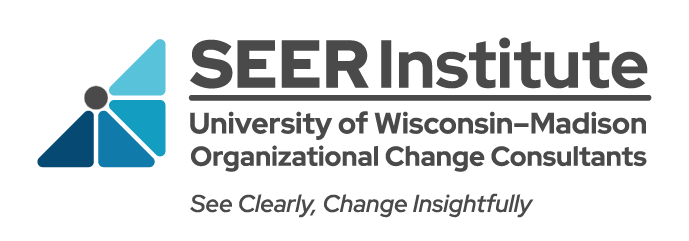National Change Resources
Table of Contents
- A Quick Start Guide to Inclusive Advising for New STEM Faculty
- A Guide to Academic Advising for STEM Faculty
- IPF for Faculty Self-Assessment Tool
- Networking Networks: Leveraging STEM Professional Society “Boundary Spanners” to Advance Diversity, Equity, and Inclusion
- Inclusion in the Classroom, Lab, and Beyond: Transferable Skills via an Inclusive Professional Framework for Faculty [Article]
- Promoting an Equity Mindset through the Inclusive Professional Framework for Faculty [Article]
- The Inclusive Professional Framework for Societies: Changing Mental Models to Promote Diverse, Equitable, and Inclusive STEM Systems Change [Article]
- The Handbook of STEM Faculty Development [Book]
- Leading Change in Gender and Diversity in Higher Education from Margins to Mainstream [Book]

Downloadable Resources
If you are interested in any of the following resources or you have questions about the resources, please reach out to:
- Dr. Lucas Hill (lhill6@wisc.edu) or
- Dr. Evangeline Su (esu6@wisc.edu)
We would love to provide whatever support and guidance you may need.
A Quick Start Guide to Inclusive Advising for New STEM Faculty
[PDF link to download coming soon]
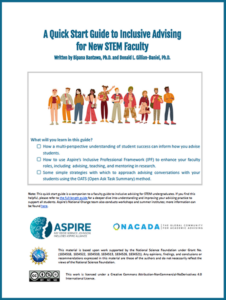 This quick-start guide is designed for new STEM (Science, Technology, Engineering, and Math) faculty interested in inclusively advising students from all backgrounds, especially students from backgrounds historically underrepresented in higher education in the U.S. and in STEM in particular (e.g., first-generation in college, and LGBTQIA+ students). We recognize that new faculty face numerous challenges in their various student-focused campus roles (e.g., teachers, researcher mentors, and advisors), as well as their peer-focused roles (e.g., colleagues and leaders). This guide is intended to provide support to you in becoming aware of the skills and knowledge that you will need to begin your journey as a more inclusive faculty member.
This quick-start guide is designed for new STEM (Science, Technology, Engineering, and Math) faculty interested in inclusively advising students from all backgrounds, especially students from backgrounds historically underrepresented in higher education in the U.S. and in STEM in particular (e.g., first-generation in college, and LGBTQIA+ students). We recognize that new faculty face numerous challenges in their various student-focused campus roles (e.g., teachers, researcher mentors, and advisors), as well as their peer-focused roles (e.g., colleagues and leaders). This guide is intended to provide support to you in becoming aware of the skills and knowledge that you will need to begin your journey as a more inclusive faculty member.
A Guide to Academic Advising for STEM Faculty
[PDF link to download coming soon]
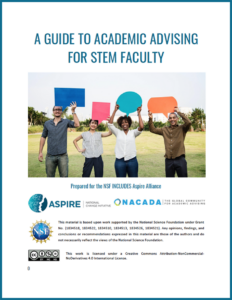 Faculty who have advising responsibilities play a critical role in a student’s progression through their undergraduate education. This is especially important for students from underrepresented minorities (URMs) such as first generation students or students from low socio-economic backgrounds LSEBs). While academic advising in higher education has been professionalized and its importance in student success has been recognized, faculty advising has not experienced the advancement in scholarship, theory and practice that is needed. Aspire’s A Guide to Academic Advising for STEM Faculty provides an overview of advising, core competencies to address the academic needs of students, and tools to help faculty be effective advisors for a diverse population of students. The tools and resources include an advising checklist for new faculty, faculty advising framework, exercises to help identify social identity, and more.
Faculty who have advising responsibilities play a critical role in a student’s progression through their undergraduate education. This is especially important for students from underrepresented minorities (URMs) such as first generation students or students from low socio-economic backgrounds LSEBs). While academic advising in higher education has been professionalized and its importance in student success has been recognized, faculty advising has not experienced the advancement in scholarship, theory and practice that is needed. Aspire’s A Guide to Academic Advising for STEM Faculty provides an overview of advising, core competencies to address the academic needs of students, and tools to help faculty be effective advisors for a diverse population of students. The tools and resources include an advising checklist for new faculty, faculty advising framework, exercises to help identify social identity, and more.
Inclusion in the Classroom, Lab, and Beyond: Transferable Skills via an Inclusive Professional Framework for Faculty
[Article (PDF); Website for “Change: The Magazine of Higher Learning”]
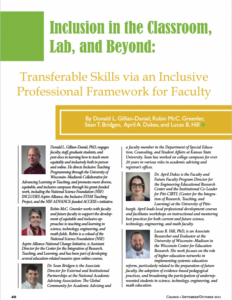 Faculty are key to promoting academic success for undergraduate students from groups traditionally underrepresented in science, technology, engineering, and mathematics. This article presents Aspire’s Inclusive Professional Framework for Faculty (IPF: Faculty), a research-grounded framework that identifies three conceptual domains that are foundational to faculty being equitable and inclusive. The framework’s three domains of identity, intercultural awareness, and relational each provides its own set of awareness, knowledge, and skills, and is transferable across multiple faculty roles. In the article, an example narrative of a day in the life of “Dr. Smith” is used to illustrate what the IPF: Faculty can look like in practice. The IPF: Faculty can provide campuses an opportunity to integrate existing diversity, equity, and inclusion professional development programming into a framework that can be iteratively explored and practiced and in turn build local institutional capacity to promote change.
Faculty are key to promoting academic success for undergraduate students from groups traditionally underrepresented in science, technology, engineering, and mathematics. This article presents Aspire’s Inclusive Professional Framework for Faculty (IPF: Faculty), a research-grounded framework that identifies three conceptual domains that are foundational to faculty being equitable and inclusive. The framework’s three domains of identity, intercultural awareness, and relational each provides its own set of awareness, knowledge, and skills, and is transferable across multiple faculty roles. In the article, an example narrative of a day in the life of “Dr. Smith” is used to illustrate what the IPF: Faculty can look like in practice. The IPF: Faculty can provide campuses an opportunity to integrate existing diversity, equity, and inclusion professional development programming into a framework that can be iteratively explored and practiced and in turn build local institutional capacity to promote change.
Promoting an Equity Mindset through the Inclusive Professional Framework for Faculty [Article]
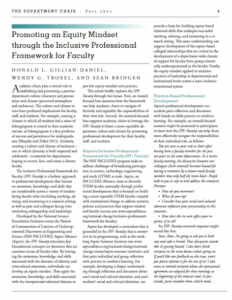 Academic chairs play a critical role in establishing and promoting a positive department culture (character and personality) and climate (perceived atmosphere and ambiance). This article briefly explores Aspire’s Inclusive Professional Framework for Faculty (IPF: Faculty) through two lenses. First, an inward-focused lens examines how the framework can help academic chairs to navigate effectively and equitably the responsibilities of their own role. Second, the outward-focused lens supports academic chairs to leverage the IPF: Faculty to foster a more equitable department culture and climate by promoting professional development for their faculty, staff, and students.
Academic chairs play a critical role in establishing and promoting a positive department culture (character and personality) and climate (perceived atmosphere and ambiance). This article briefly explores Aspire’s Inclusive Professional Framework for Faculty (IPF: Faculty) through two lenses. First, an inward-focused lens examines how the framework can help academic chairs to navigate effectively and equitably the responsibilities of their own role. Second, the outward-focused lens supports academic chairs to leverage the IPF: Faculty to foster a more equitable department culture and climate by promoting professional development for their faculty, staff, and students.
The Inclusive Professional Framework for Societies: Changing Mental Models to Promote Diverse, Equitable, and Inclusive STEM Systems Change [Article]
Science, technology, engineering, and mathematics (STEM) professional societies (ProSs) serve broad memberships, define disciplinary norms and culture, and inform accrediting bodies and thus provide critical levers for systems change. Inclusive STEM system reform requires that underlying “mental models” be examined. The Inclusive Professional Framework for Societies (IPF: Societies) is an interrelated set of strategies that can help ProSs change leaders (i.e., “boundary spanners”) and organizations identify and address mental models hindering DEI reform. The IPF: Societies uses four “I’s”—Identity awareness and Intercultural mindfulness (i.e., equity mindset) upon which inclusive relationships and Influential DEI actions are scaffolded. This article discusses how the IPF: Societies complements existing DEI tools and how it can be applied to existing ProS policy and practice associated with common ProS functions (e.g., leadership, membership, conferences, awards, and professional development). Ultimately, the IPF: Societies has potential to promote more efficient, effective, and lasting DEI organizational transformation and contribute to inclusive STEM disciplinary excellence.
The Handbook of STEM Faculty Development [Book]
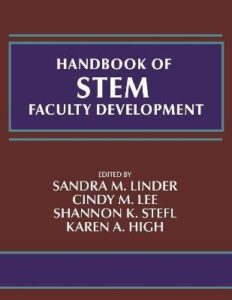 It is critical to provide STEM faculty with the professional development to support their complex roles and to base this development on evidence derived from research. This edited handbook provides STEM stakeholders with an opportunity to share studies and/or experiences that explore STEM faculty development (FD) in higher education settings. The Aspire National Change team and collaborators authored the chapter “The Aspire Alliance inclusive professional framework for faculty—Implementing inclusive and holistic professional development that transcends multiple faculty roles.” This chapter describes the Aspire Alliance’s inclusive professional framework for faculty (IPF:Faculty), a tool for focusing on transferable, inclusive skills and practices when creating new and modifying existing professional development programming for faculty, future faculty, and staff. The IPF:Faculty provides a holistic approach to professional development that prioritizes a cultural shift in the creation and sustainability of institution-wide equitable environments for all participants in higher education.
It is critical to provide STEM faculty with the professional development to support their complex roles and to base this development on evidence derived from research. This edited handbook provides STEM stakeholders with an opportunity to share studies and/or experiences that explore STEM faculty development (FD) in higher education settings. The Aspire National Change team and collaborators authored the chapter “The Aspire Alliance inclusive professional framework for faculty—Implementing inclusive and holistic professional development that transcends multiple faculty roles.” This chapter describes the Aspire Alliance’s inclusive professional framework for faculty (IPF:Faculty), a tool for focusing on transferable, inclusive skills and practices when creating new and modifying existing professional development programming for faculty, future faculty, and staff. The IPF:Faculty provides a holistic approach to professional development that prioritizes a cultural shift in the creation and sustainability of institution-wide equitable environments for all participants in higher education.
Leading Change in Gender and Diversity in Higher Education from Margins to Mainstream [Book]
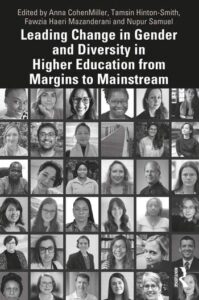 This edited book provides international insights and recommendations around topics of gender and diversity in higher education linking to larger societal goals of improving equality. The Aspire National Change team and collaborators authored the chapter “Improving gender diversity in STEM through an inclusive professional framework.” This chapter explores the Inclusive Professional Framework for Faculty, (IPF: Faculty)–a research-grounded, holistic professional development framework, and how it can inform the approach higher education leaders take to advance the work of equity and inclusion on their campuses, particularly their work to address gender disparities. The chapter explores a graduate-level course as a case study for the application of IPF principles in a student-focused context, and considers how these principles can impact STEM trainees, with a particular focus on graduate students and postdoctoral researchers (postdocs). Then it takes a look at how the IPF: Faculty can be applied at a broader, systems level to influence institutional policies, and the overall training structure of STEM higher education. The chapter concludes with recommendations for all institutional leaders for creating structures and systems within their units that empower individuals at all levels to advocate for their own progress and career success.
This edited book provides international insights and recommendations around topics of gender and diversity in higher education linking to larger societal goals of improving equality. The Aspire National Change team and collaborators authored the chapter “Improving gender diversity in STEM through an inclusive professional framework.” This chapter explores the Inclusive Professional Framework for Faculty, (IPF: Faculty)–a research-grounded, holistic professional development framework, and how it can inform the approach higher education leaders take to advance the work of equity and inclusion on their campuses, particularly their work to address gender disparities. The chapter explores a graduate-level course as a case study for the application of IPF principles in a student-focused context, and considers how these principles can impact STEM trainees, with a particular focus on graduate students and postdoctoral researchers (postdocs). Then it takes a look at how the IPF: Faculty can be applied at a broader, systems level to influence institutional policies, and the overall training structure of STEM higher education. The chapter concludes with recommendations for all institutional leaders for creating structures and systems within their units that empower individuals at all levels to advocate for their own progress and career success.
